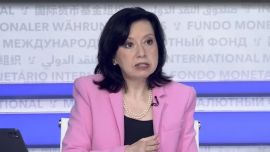President Javier Milei’s administration unexpectedly allowed the peso to weaken this week, while simultaneously moving to prevent the rush out of the currency from turning into a stampede that would reignite inflation.
After burning through some US$100 million a day last week to prop up its slumping currency ahead of a key provincial election, the Treasury slashed dollar sales in the spot market, allowing the peso to weaken close to the upper end of its trading band.
Economy Minister Luis Caputo said late Thursday that the Treasury had stepped back on signs the market was normalising.
At the same time the Treasury was backing out of the market, though, the central bank was stepping in to defend the peso by selling overnight repos to soak up some of the cash that investors has been using to buy dollars. Data from local futures market A3 indicates the bank also revived sales of dollar futures contracts to prop up the peso.
While the policies have largely worked for now — local interest rates came off record highs and foreign bonds rebounded from Monday’s slump — authorities have ever less room to maneuver. The peso, which tumbled 4% Monday and continued to fall every day this week, can’t drop much further without blowing through the upper band limit set by the government. The Treasury is running low on greenbacks and the central bank’s dollar futures operations are beginning to approach their legal limit. Rates, while down from last week, are still at 35%.
“The government is running out of instruments to act in the market,” said Gabriel Caamaño, a partner at the consultancy Outlier.
Central Bank futures now stand at about US$6 billion, Caamaño estimated, one of the highest levels on record and nearing a US$9-billion regulatory cap. Meanwhile, Treasury cash deposits in foreign currency have fallen below US$1.1 billion, limiting its scope for intervention.
Surprise
The government’s willingness to let the peso slide – if only moderately – came as a surprise to the market after Milei insisted their would be no change in policy following his defeat in local elections in Buenos Aires Province over the weekend.
The government is employing “distraction tactics,” wrote Pedro Martínez, an economist at the consultancy PxQ in a report to clients. “They affirm that they won’t change monetary/exchange rate policy, while making substantial modifications to the system.”
Officials stepped back after liquidity in markets returned to normal following “attacks” ahead of the election in Buenos Aires Province, Caputo said on a live-stream late on Thursday. Investors had been trimming positions in Argentina ahead of the vote, and rushed to sell on Monday after Milei’s party suffered a resounding loss.
“This week we haven’t been in the exchange market at all,” Caputo said. If the peso is trading weaker because the market perceives greater risk or wants more hedging, “that’s for the market to decide. Liquidity has recovered, so we don’t need to show up.”
Caputo didn’t mention the use of repos or sales in the dollar futures market. The Central Bank declined to comment further and the Economy Ministry didn’t respond to requests for comment.
Floor
Argentina’s more pragmatic approach helped halt the slide in the country’s assets.
Sovereign notes maturing in 2035 gained almost three cents in the past three days, recouping part of the losses triggered by the electoral setback on Monday. The three-day climb is the steepest since June.
“Markets are focusing on how the FX regime behaves and whether authorities will need to intervene into October,” said Ivan Stambulsky, a strategist at Barclays. “The few days post-election were positive in this regard, but the FX is close to the ceiling and stronger FX sales again in the coming weeks can’t be ruled out.”
Speaking on the same live-stream as Caputo on Thursday night, Central Bank Governor Santiago Bausili said that “the exchange rate policy will not be modified in any way” and that Argentina will keep the exchange rate bands.
Election fear
Investors’ ultimate fear is that Milei’s party will lose midterm congressional elections in October, undermining his attempts to overhaul the South America’s second-largest economy. To prevent that, the libertarian needs to stabilise the peso, reduce interest rates and revive growth.
But with people losing faith in the peso, that is going to be a tall order.
Investors including Paula Gandara, chief investment officer at Adcap Asset Management in Buenos Aires, expect volatility to remain high until the October vote.
After his party’s loss on the Buenos Aires weekend vote, Milei vowed to amend political mistakes, fuelling speculation over a potential Cabinet reshuffle. But so far, the President hasn’t revealed any drastic changes to his team, and early signals of closer ties with governors that could boost his standing have yet to materialise. Further setbacks in Congress could also hurt the notes.
Morgan Stanley abandoned its bullish call on Argentina after the election loss. JPMorgan Chase & Co told clients this week to implement hedges while keeping exposure to Argentina’s local bonds, seeing “a more challenging path” ahead.
Peso defence
Argentine assets had been under pressure even before the Buenos Aires vote, with investors lowering their exposure amid corruption allegations involving his inner circle and setbacks in congress, as well as to reduce exposure going into the vote.
In part to defend the peso, the Central Bank stepped up use of overnight, interest bearing repos, just two months after dismantling seven-day repurchase agreements known as LEFIs. Starting in late August, the new one-day security, listed simply as “other” on the Central Bank’s balance sheets, began to appear.
The bank sold 1.1 trillion pesos of the new repos on Tuesday, pushing the stock to 4.5 trillion pesos. Yields on the repos fell to around 35 percent, down from highs of 45 percent at the start of the week after the weaker peso eased fears of a sudden devaluation, taking the pressure off local rates.
It also sold dollar contracts pushing the market’s open interest up by US$125 million on Wednesday, leaving the outstanding position to about US$7.8 billion. Past data indicates the Central Bank represents about 80 percent of those positions.
“The real test will come with the turn of the month,” Caamaño added. “That will be the moment when tensions could flare up again, because the electoral noise will return and individuals, who are now over-dollarised, will once again have pesos in their pockets. We’ll see how much conviction lies behind this new, pragmatic playbook.”
related news

Argentina shale can resist political risk, Milei oil chief says

IMF offers Milei timely backing, hails progress on inflation, fiscal reform

Flight carrying Argentines deported from United States lands in Buenos Aires

Milei vetoes state university funding bill, escalating conflict with education sector
by Ignacio Olivera Doll & Nicolle Yapur, Bloomberg















Comments